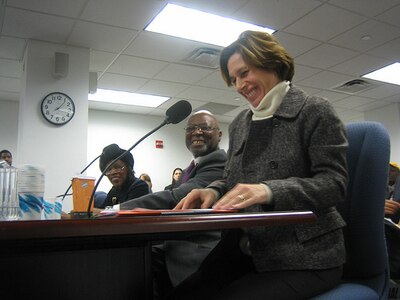
A group of parent activists and union members is expressing anger with teachers union leader Randi Weingarten, telling her that she has dropped the ball in fighting for checks to the mayor’s power over schools.
The frustration began with a May 21 New York Post column, in which Weingarten indicated that she is open to allowing the mayor to continue appointing a majority of members to the citywide school board. A union task force recommended in February that the state legislature reverse that majority as a way to strengthen the board, known as the Panel for Education Policy or PEP.
Weingarten’s Post op/ed dismayed some members of her own union. “I was quite disappointed and angry, actually,” said Lisa North, a teacher who sat on the union’s task force to consider revisions to mayoral control.
North said the task force never seriously considered recommending that the mayor keep his majority of appointments, and so when union delegates ratified the committee’s final recommendations, she expected Weingarten to promote them. “The delegate assembly is supposed to be the highest authority of the union, and it voted for it,” she said.
In an interview today, Weingarten acknowledged that people have reached out to her with concerns about her position, including her own union members. “I did get a couple of e-mails from members saying, ‘Why are you doing what you’re doing?'” she said. She said that she empathizes with those concerns. “I totally and completely understand and concur with the frustrations that many have that this mayor and this chancellor have not listened to and respected enough the voices of those who go to our schools, their parents, and those who teach them,” she said.
But she also said that she has to weigh concerns about checking the mayor’s power against the reasons she supported giving the mayor control in 2002. “It’s always been a balance of stability, cohesion, and responsibility, which is what mayoral control brought us, and modifying it to create sufficient checks and balances and transparency,” Weingarten said.
Parent leaders, who had hoped to ally with the United Federation of Teachers to lobby in Albany, also say they feel alienated by Weingarten. Lisa Donlan, a Manhattan parent who is part of the Parent Commission on School Governance, which is calling for significant changes to mayoral control, said the Post column ended discussions between the union and parent leaders who are strategizing about how to lobby lawmakers. Donlan said the Parent Commission had been trying to identify areas of agreement among all of the groups who have suggested revisions to mayoral control so that it could present a unified slate of recommendations in Albany.
“We felt very comfortable going into that conversation [with the UFT] that we all believe that the mayor should not have control of the central board,” Donlan told me.
The confidence disappeared with the Post article, Donlan said. “That conversation did stop when [Weingarten] pulled back on the composition of the PEP,” she said. “We feel very disappointed that we don’t have the UFT advocating any more for that shift at the central level, where policy is made.”
Activists within the teachers’ union are also showing their concern. “The idea that [Weingarten] would have a task force that spent a year studying the issue and then on her own, say something different … This is a betrayal of the task force concept,” said union activist Norm Scott.
“I do feel betrayed,” said Michael Fiorillo, another chapter leader who sat on the union’s task force. “I just wish I could say I felt surprised.” He said Weingarten has veered away from members’ consensus on other topics in the past, and so he had early doubts that she would hold firm on the task force’s recommendations. (Fiorillo ultimately voted against the recommendations, saying they weren’t aggressive enough curbs on mayoral control.)
“My guess would be the sense of betrayal would be stronger among people outside the union,” Fiorillo said, noting that union members were accustomed to watching Weingarten change her mind.
In the interview, Weingarten emphasized two checks to the mayor’s power that do not involve the school board: empowering district superintendents and parent councils to have more decision-making power. “There’s different kinds of ways to get to the standards I just set out,” she said, referring to her commitment to ensuring “checks and balances” and “transparency.”
Weingarten’s critics say that checks and balances are insufficient in a system that is fundamentally flawed. “From the Parent Commission’s point of view, unless we change the balance of power, all of the minor adjustments to the system would be severely handicapped,” Donlan said.
